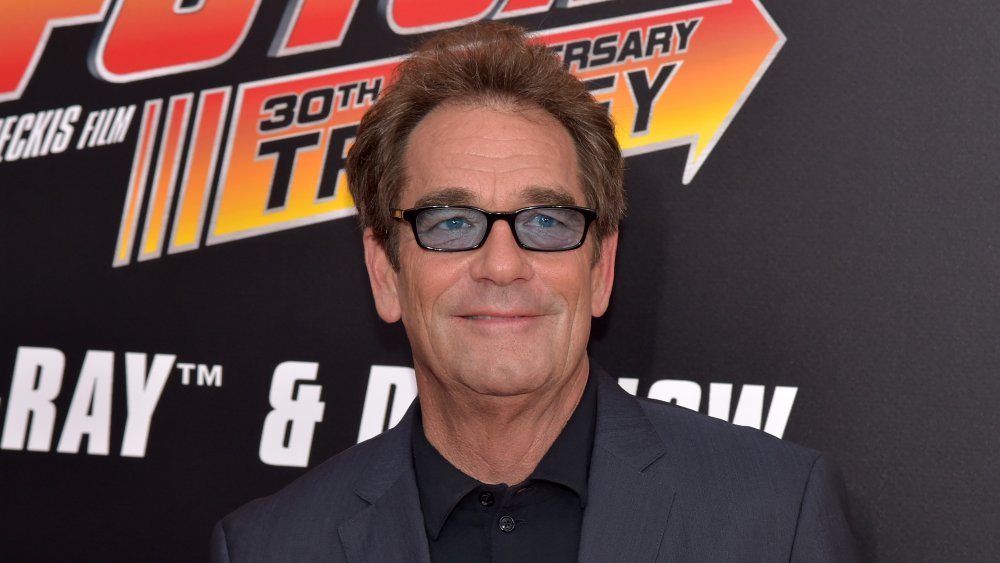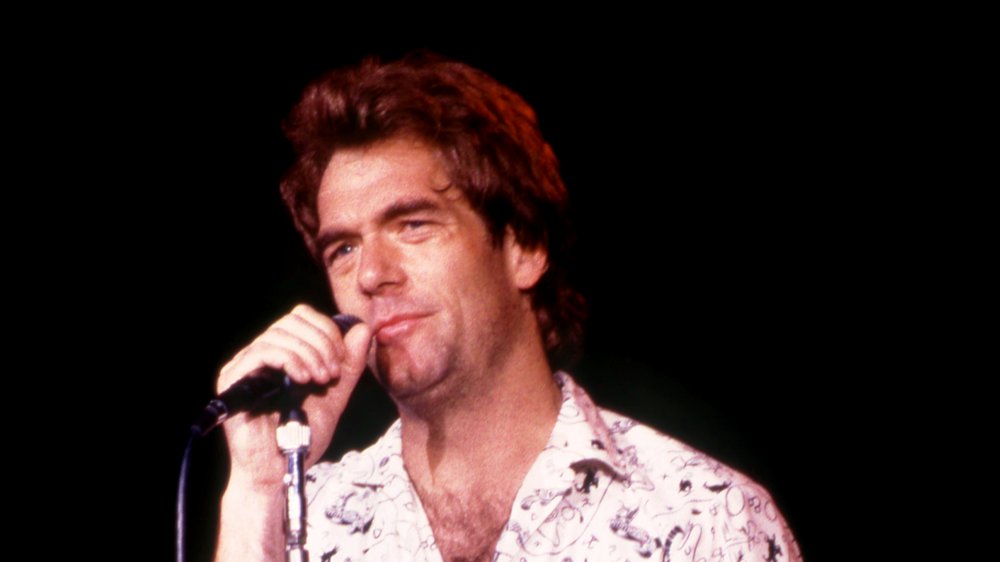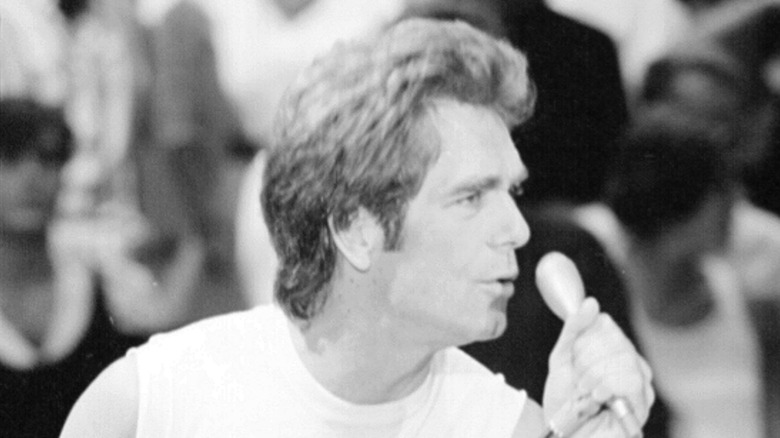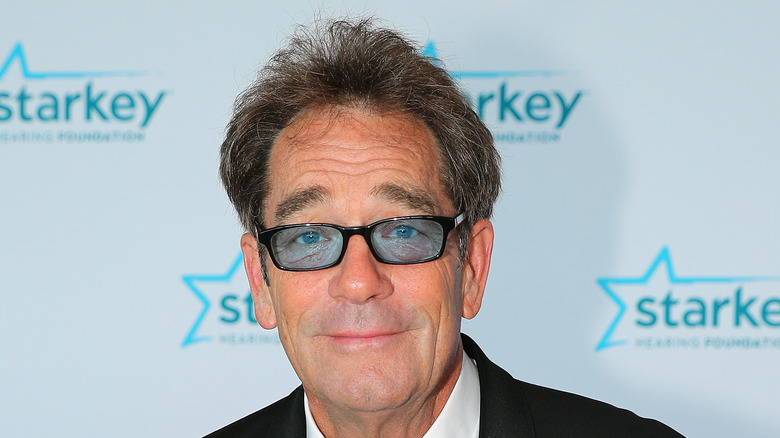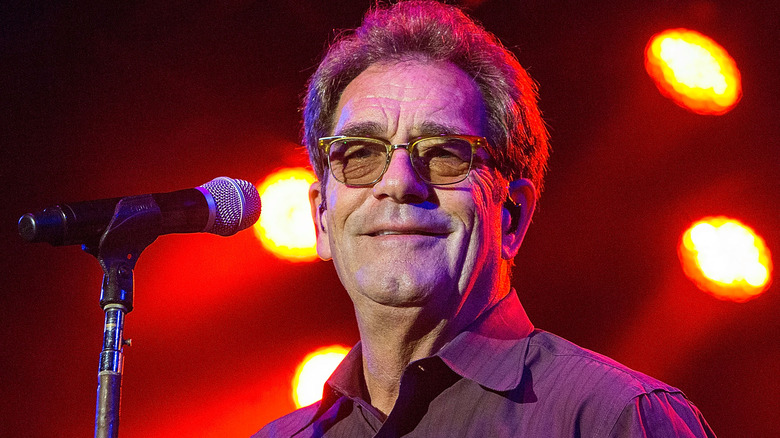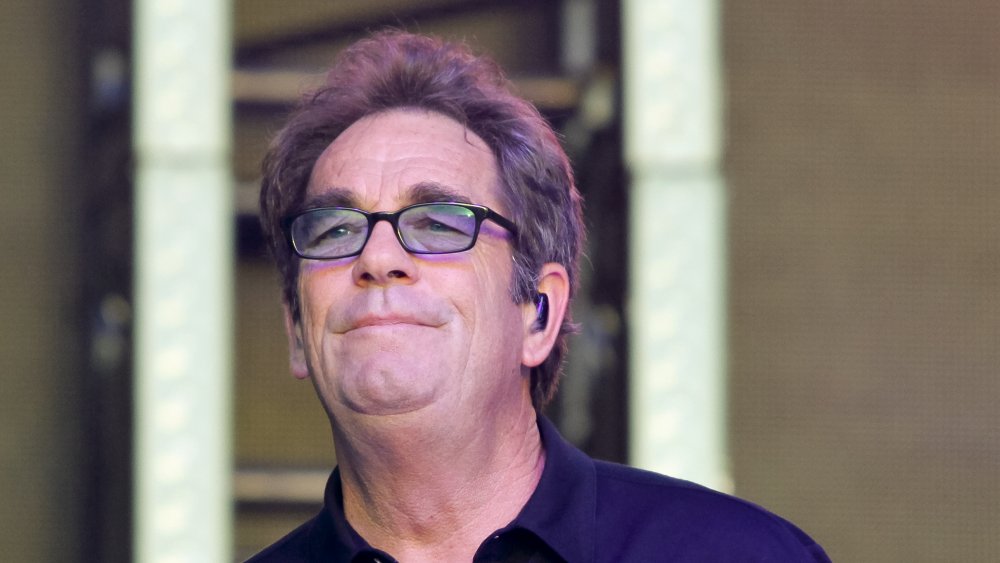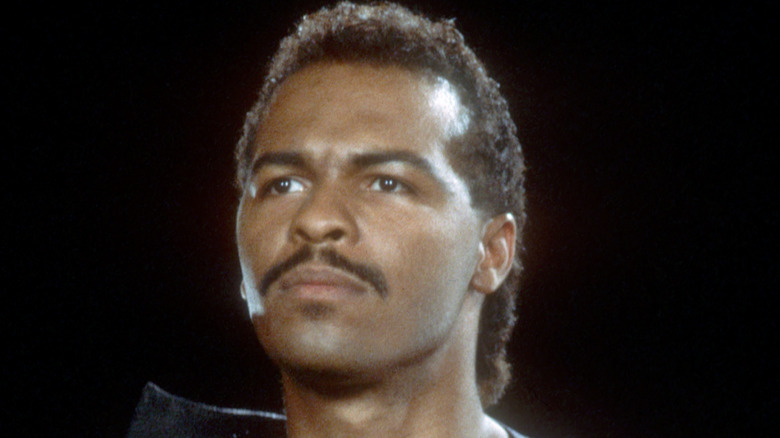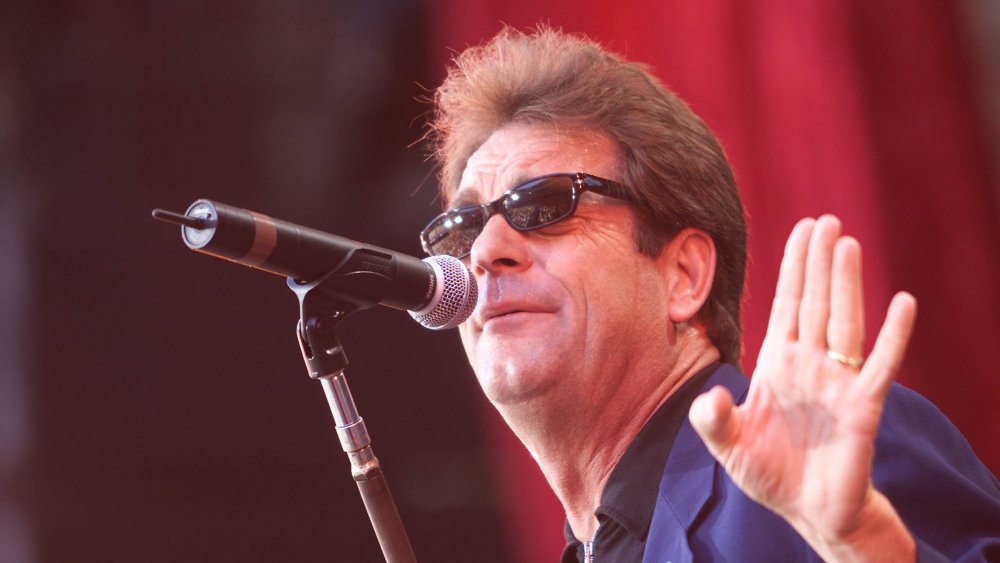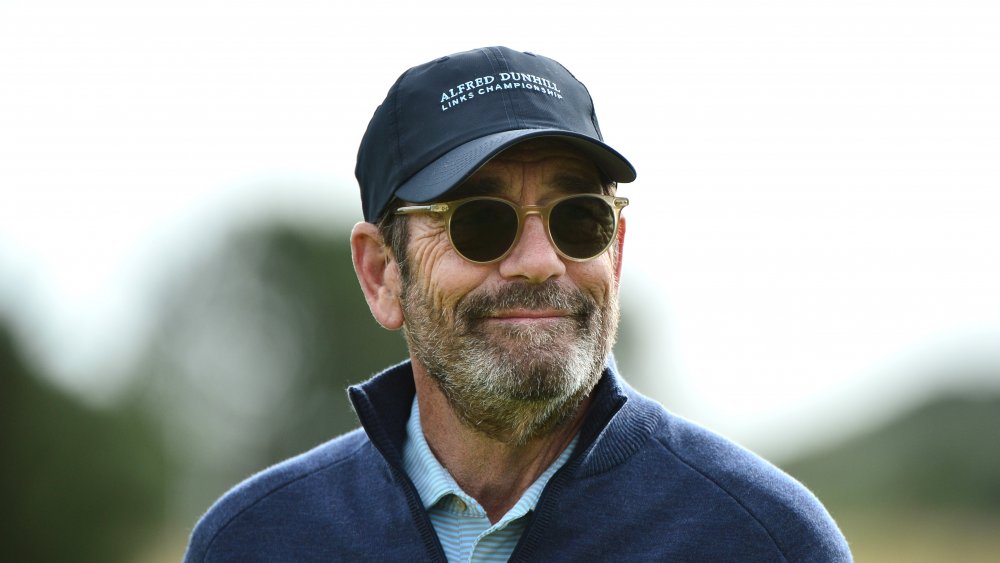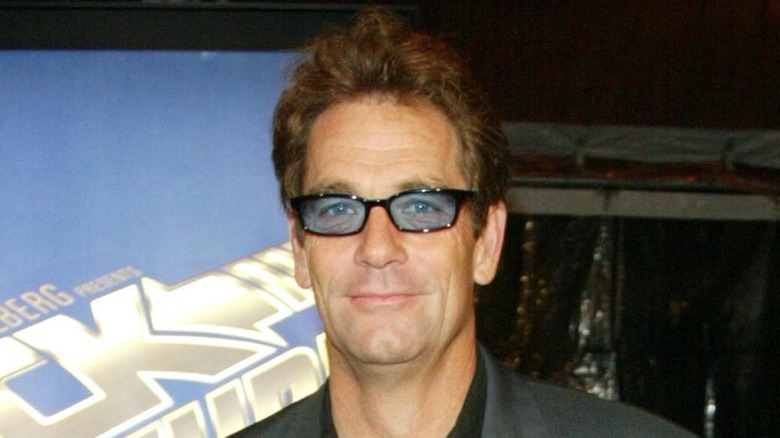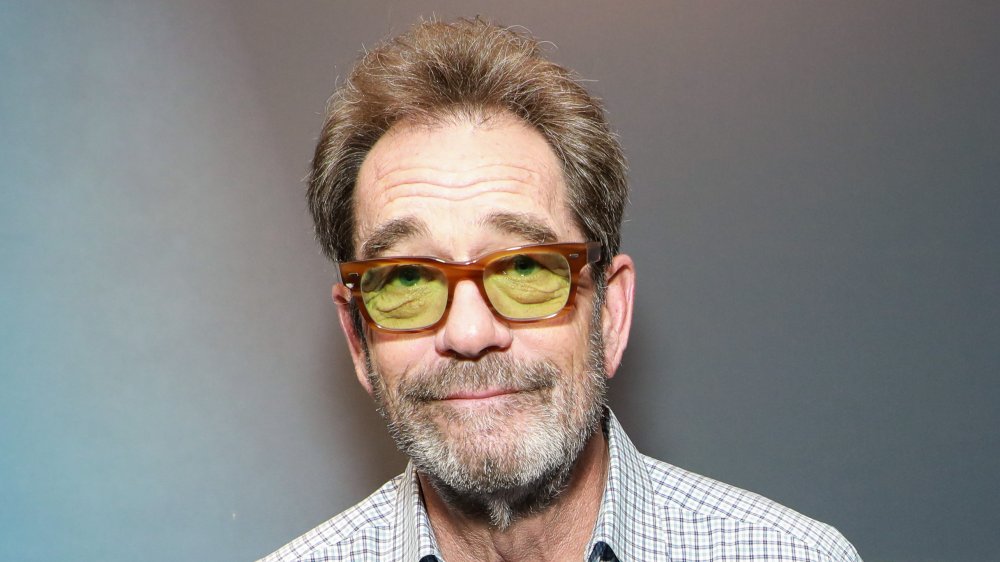The Tragic Real-Life Story Of Huey Lewis
Today's audiences might not be all that familiar with the name, but very few people have managed to avoid the music of Huey Lewis & The News. For a few precious years in the 1980s, Lewis and his gang were the kings of the music hill. The group's poppy, crisp rock and Lewis' distinctive vocal stylings (and, occasionally, his solid harmonica skills) helped them score multi-platinum albums and a string of beloved hits that still haunt the radio waves, including monsters like "If This Is It," "Heart of Rock and Roll," "Stuck with You," and "I Want A New Drug."
Lewis is also responsible for no less than two iconic movie tunes: the theme song for 1985's "Back to the Future," "The Power of Love," and "Hip to Be Square," which was a hit in its own right but became iconic when it appeared in 2000's "American Psycho."
With a career like that, it's clear that Lewis was a success. However, as with many other musicians, his wealth and fame came with a price. Let's take a look at the tragic real-life story of Huey Lewis.
Huey Lewis' parents got a divorce
Huey Lewis was born in 1950 in New York City as Hugh Anthony Gregg III, but as SF Gate tells us, his jazz-drumming radiologist father and commercial artist mother moved to San Francisco's Marin County when he was 4 years old. The area was a center for the bohemian arts movement, and it was closer to nature than the Big Apple. Lewis was an extremely smart kid with an early interest in music, so the club-filled area was pretty perfect for his interests. Unfortunately, the idyllic family life didn't last for long, because the musician's parents divorced when he was still young.
In a 2001 interview with journalist Jill Kramer, Lewis said that the divorce happened when he was 11 or 12, and he hinted that the split wasn't entirely amiable. However, in a 2019 post on the Huey Lewis & The News' official Facebook page, the singer notes that the cloud of divorce had an unexpected silver lining. His mother started renting out a room in their home, and the tenant happened to be a folk musician called Billy Roberts, whose instruments of choice were the guitar and the harmonica. "He had a zillion harmonicas, and he gave me a bunch of his old ones," Lewis reminisces. "That's how I first got into them."
His school decision turned into a court battle
Huey Lewis was a clever kid, so it's no surprise that he was bound for a pretty decent school. However, in an interview with journalist Jill Kramer, the artist revealed that things took a dark turn when his dad wanted to send him to prep school, and his mother emphatically didn't. They weren't together anymore at that point, and things were already pretty contentious — at least, judging by the fact that Lewis' mother took his father to court over the issue of their son's education. "It was kind of an ugly scene," Lewis described of the situation.
In the end, the case was resolved when the judge asked Lewis what he personally thought about it. He ended up choosing to go away to prep school, but he found the experience markedly different from the brochures. "My dad had given me the catalog that had a picture of this gorgeous quad with ivy-covered buildings and big trees and a guy crossing the quad with a gal – Buffy and Biff – and she was tremendous-looking," Lewis reminisces.
Unfortunately, the pretty lady in the catalog turned out to be a marketing trick, and the young man ended up spending four years in a school full of other "Biffs."
Young Huey Lewis had some trouble on the road
In 1968, Huey Lewis took a year off before college and spent it traveling the world, according to the singer's interview with journalist Jill Kramer. While this was no doubt a cool experience as a whole, it also led to some trouble that was serious enough for him to reminisce about it over three decades later.
Lewis was a long-haired young man, which was significantly worse in dictator Francisco Franco's Spain than it might have been at, say, Woodstock. As a result, his hitchhiking endeavors were less than successful, and it wasn't uncommon for him to wait as long as 12 hours between rides. This gave him a chance to improve his musical skills, though. "The only people who would pick me up were German tourists," Lewis remembers. "So I'd play harmonica by the side of the road until my lips bled."
Another Spain-themed pickle happened when Lewis was coming back from Morocco and lost his passport. It was Friday, and he had no money at all, save for what it would take him to get a new passport when the American Embassy opened on Monday. Fortunately, those punishing harmonica exercises during the lonely hours by the road ended up saving him. He bumped into a bunch of art students in Seville, and they were so impressed by his harmonica skills that they hooked him up with a guitar player. They ended up playing a pretty big concert — Lewis' first ever.
The singer let big bucks slip away
No one can deny that Huey Lewis & The News were massive in the 1980s, but as CNBC tells us, Lewis and his merry men could have been even bigger — financially, at least. In the early 1980s, a little-known soft drink called Coca-Cola approached them to appear in their commercials, which would have been a huge deal. After all, Michael Jackson had just shown the world what celebrity endorsements could be, courtesy of his record-breaking $5 million deal with Pepsi.
Lewis decided to pass on the opportunity, and while he had his reasons, he was still calling the decision idiotic in 2016. "We had just started selling out concerts, making more money than we'd ever made," Lewis told CNBC. "And I thought why would I do this for money? I'm an artist. I'm an artist, and an idiot." These days, he says, he would go for such an opportunity in a heartbeat.
Incidentally, if you're wondering why Coke would reach out to Huey Lewis when their competitor had Michael Jackson, it's worth noting that according to Rolling Stone, the company's representatives told the musician that he had the highest Q Score (consumer appeal score) of anyone in the United States at the time. That's how popular the guy was back in the day.
Huey Lewis lost hearing in his right ear
In 1987, Huey Lewis suddenly lost all hearing in his right ear, according to Rolling Stone. This was a bit of a problem, because he was at the absolute height of his career at the time, and hearing is generally considered a pretty important skill for a musician. "I felt like I had been in a swimming pool and my ear was full," the artist has described of the sensation. "I couldn't shake it out or pop my ears."
Lewis was eventually diagnosed with Meniere's disease, which the National Institute on Deafness and Other Communication Disorders defines as an inner ear disorder that can cause all sorts of problems, including vertigo, tinnitus and — well, pretty much what Lewis describes. No medical professional could fix the issue, and one simply told Lewis to "get used to it." Eventually, it became clear that this was his only option.
Lewis soon discovered that amazing musicians like Brian Wilson of the Beach Boys also operated with a similar aural arsenal. As such, Lewis adjusted and was able to carry on his business as usual. Sadly, this wouldn't be his last struggle with hearing issues.
Huey Lewis and the American Psycho boycott
The film version of Bret Easton Ellis' "American Psycho" came out in 2000, and like the book, it wasn't shy of showing Patrick Bateman's (played by Christian Bale) love for Huey Lewis & The News. However, as M Live tells us, Lewis actually ended up boycotting the movie. This didn't have anything to do with the scene where an unhinged Bateman delivers a speech about Lewis' music before dispatching a professional rival (Jared Leto) with an ax. In fact, Lewis was familiar with "American Psycho" before the film and has told Rolling Stone that he's quite happy to be associated with it. He's even played the killer in a "Funny or Die" parody version of the famous scene.
The boycott came after he decided to pull "Hip To Be Square" from the movie's soundtrack album for reasons unrelated to the film itself — but the people behind the movie claimed that he removed it because he was so disgusted by the film's violence. Understandably, the singer didn't much care for being set up as a pearl-clutcher.
As it happens, the author of "American Psycho" has expressed regret that he linked Lewis' crew to his work in the first place. "They weren't a favorite band — I was much more a Bruce Springsteen person than a Huey Lewis person — but I didn't think they deserved it," Ellis told Billboard in 2014. "I liked them more than the implied criticism of them that's in the text."
Huey Lewis and the Ray Parker Jr. controversy
"Who you gonna call" to thank for the iconic Ghostbusters theme? It's a good question. Buckle up, because it's about to get complicated.
As Mental Floss and the Ledger Note tell us, the opportunity to write the "Ghostbusters" theme song came to Ray Parker Jr. after Lindsey Buckingham and Huey Lewis had both declined the honor. Parker certainly succeeded, but before long, Lewis' lawyers came knocking. Per Billboard, the reason was the alleged similarity between Parker's smash hit and Huey Lewis & The News' "I Want A New Drug," which had come out just a few months before. The case was eventually settled out of court.
In 2001, Lewis decided to weigh in on the ruling on a VH1 "Behind the Music" episode. "The offensive part was not so much that Ray Parker Jr. had ripped this song off," sources quote him saying. "It was kind of symbolic of an industry that wants something -– they wanted our wave, and they wanted to buy it." Lewis also reportedly made pretty clear what he thought about the settlement money. "In the end, I suppose they were right. I suppose it was for sale, because, basically, they bought it."
This prompted Parker to sue Lewis for breaching an alleged confidentiality clause from the 1984 lawsuit. Unfortunately, we may never find out how that lawsuit ended, because everyone involved has stayed silent on the issue since then.
Huey Lewis separated from his wife
Rock stardom and domestic bliss are always a volatile combination. According to the Los Angeles Times, it seems that even the relatively wholesome Huey Lewis is no exception. He separated from his wife after they had two children. In an interview with the golf magazine Kingdom, Lewis notes that the pair got married in 1983 in Hawaii, but their union ended up lasting only six years. However, he does maintain that they're "still pals."
In 2001, Lewis reflected on the specifics of the relationship in an interview with Jill Kramer. He said he met his wife, Sidney, in the late 1970s, when she was the secretary for Bob Brown, Lewis' future manager. The musician freely admits that Huey Lewis & The News' peak success years were quite difficult for her. "I was gone a lot then," he says. "And I worried about it. It was mainly hard on my wife, because she had to take care of everything."
He went to the Montana Supreme Court
It's not exactly unknown for a famous musician to find himself in court. However, Huey Lewis has taken things a little bit further, as he actually ended up in a state's Supreme Court.
Lewis is an avid fisherman, and in an interview with White Fish Review, he discusses a peculiar, fishing-themed case that went all the way to the Montana Supreme Court in 2008. It started roughly two decades earlier, when the musician bought a property in Montana. A problem arose when a waterway that Lewis defined as a minor irrigation ditch was seen as a stream by the locals. Because Montana's Stream Access Laws allow anglers free access to pretty much any stretch of water that's large enough, the situation soon escalated into a situation where Lewis didn't want people to come fish in his ditch, but the people didn't want Lewis to prevent them from angling in his stream.
"It became cause celeb [sic] to go after these 'rich guys,' and they painted this picture of us coming in, buying property with public water, and fencing the public off from the water," Lewis describes the situation. "Which was a lie."
The case ended up making its way higher and higher in the state's judicial system, and Lewis raked in "it's a ditch"-themed victories. After 20 years, however, it finally went to the Montana Supreme Court, which decided to open the ditch-turned-stream to the public.
Huey Lewis lost his hearing ... again
In early 2018, Huey Lewis had to once again deal with hearing loss — and this time, things were even more difficult. As Rolling Stone tells us, Lewis was in Dallas to play a concert with his band, when his hearing suddenly went haywire. "I heard this huge noise," he describes the situation. "It sounded like warfare was going on in the other room. I yelled, 'What is that?' They said, 'It's just Pat [Green], the opening act.'"
Green hadn't suddenly switched to experimental heavy metal. Lewis simply couldn't make any sense of what he heard. Everything was just a horrible racket, and when it was time to perform, he couldn't hear his own voice, let alone find a pitch.
After some rapid cancellation of upcoming shows, Lewis started once again seeking medical help for his condition, which he describes as a "roaring tinnitus." This proved futile. But as a minor comfort, the musician discovered that his condition came and went, depending on the day. Some days, he can keep up with a phone conversation with hearing aids on. Other days, he won't even know if the phone rings.
Tragically, the condition heavily impacts Lewis' ability to listen to music. On a bad day, he can't find a pitch, and the bass crumbles into a nasty static. While he could theoretically still perform on a good day, the periodical nature of the hearing loss makes touring borderline impossible.
Huey Lewis contemplated suicide after losing his hearing the second time
Huey Lewis was in a dark place when he was struggling with his second hearing loss in 2018, per the Los Angeles Times. While he is not deaf, the condition left him with hearing that was coming and going, and music sounded like distortion in his ears. This essentially destroyed his ability to reliably perform — and it happened at a time when he and the News were working on a new album of original material for the first time since 2001's "Plan B."
As such, Lewis found the experience so profoundly harrowing that he even considered suicide. "There was literally a roaring tinnitus in my head," the singer told Rolling Stone. "There was nothing I could do. I'd just lay in bed and contemplate my demise."
Fortunately, the singer has learned to live with the situation, and he's even devised a scale of one to ten to help others understand how well he's doing on a particular day. He regularly looks into treatments that might help restore his hearing to a state that would allow him to play live again ... but he's also accepted the idea that this might never happen.
If you or anyone you know is having suicidal thoughts, please call the National Suicide Prevention Lifeline at 1-800-273-TALK (8255).
